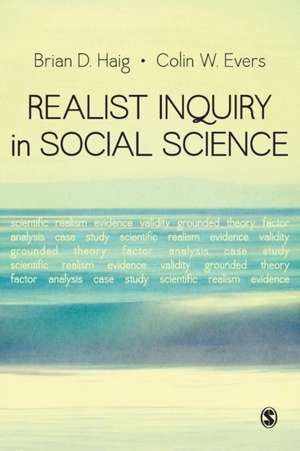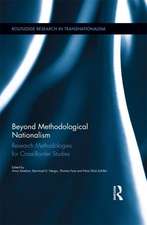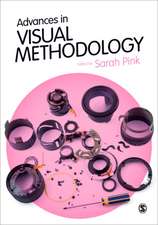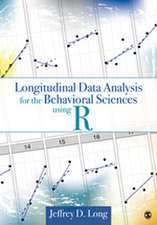Realist Inquiry in Social Science
Autor Brian Douglas Haig, Colin Eversen Limba Engleză Paperback – 14 dec 2015
Grounded in philosophical methodology, this book goes beyond understanding knowledge justification only as empirical validity, but instead emphasises the importance of theoretical criteria for all good research. The authors consider both quantitative and qualitative research methods, and approach methodology from an interdisciplinary viewpoint. Using abductive reasoning as the starting point for an insightful journey into realist inquiry, this book demonstrates that scientific realism continues to be of major relevance to the social sciences.
| Toate formatele și edițiile | Preț | Express |
|---|---|---|
| Paperback (1) | 407.60 lei 6-8 săpt. | |
| SAGE Publications – 14 dec 2015 | 407.60 lei 6-8 săpt. | |
| Hardback (1) | 1016.48 lei 6-8 săpt. | |
| SAGE Publications – 13 dec 2015 | 1016.48 lei 6-8 săpt. |
Preț: 407.60 lei
Nou
Puncte Express: 611
Preț estimativ în valută:
77.100€ • 80.91$ • 65.04£
77.100€ • 80.91$ • 65.04£
Carte tipărită la comandă
Livrare economică 27 martie-10 aprilie
Preluare comenzi: 021 569.72.76
Specificații
ISBN-13: 9781446258859
ISBN-10: 1446258858
Pagini: 168
Dimensiuni: 156 x 234 x 13 mm
Greutate: 0.02 kg
Ediția:1
Editura: SAGE Publications
Colecția Sage Publications Ltd
Locul publicării:London, United Kingdom
ISBN-10: 1446258858
Pagini: 168
Dimensiuni: 156 x 234 x 13 mm
Greutate: 0.02 kg
Ediția:1
Editura: SAGE Publications
Colecția Sage Publications Ltd
Locul publicării:London, United Kingdom
Recenzii
The current replication crisis in psychology makes professors’ Haig and Evers book as timely as it is erudite. Using philosophical realism as their organizing principle, they take the reader on a creative and insightful tour through validity, Grounded Theory, factor analysis and case studies in an effort to improve and advance psychological research.
Realist Inquiry in Social Science comes as a complete breath of fresh air in a domain predominated by anti-realism. I was especially charmed and mesmerized by its recognition of the primacy of problems and its focus on abductive reasoning.
This book provides an accessible and systematic introduction to Realist methodologies in the social sciences. It covers qualitative and quantitative research methods from a Realist perspective, making clear how this approach provides a fruitful and practical way for social scientists to approach research methods. That a book of such clarity should have been written by Brian Haig and Colin Evers is not surprising. Over the past three decades, Realism has moved from the periphery of methodological considerations to taking centre stage. In the social sciences these authors have been central to the change in Realism’s fortunes.
Realist Inquiry in Social Science comes as a complete breath of fresh air in a domain predominated by anti-realism. I was especially charmed and mesmerized by its recognition of the primacy of problems and its focus on abductive reasoning.
This book provides an accessible and systematic introduction to Realist methodologies in the social sciences. It covers qualitative and quantitative research methods from a Realist perspective, making clear how this approach provides a fruitful and practical way for social scientists to approach research methods. That a book of such clarity should have been written by Brian Haig and Colin Evers is not surprising. Over the past three decades, Realism has moved from the periphery of methodological considerations to taking centre stage. In the social sciences these authors have been central to the change in Realism’s fortunes.
Cuprins
Chapter 1: Scientific Realism
What is Realism?
Naturalistic Realism
Global and Local Realism
Realist Methodology
The Centrality of Method
Realism in the Social Sciences
Chapter 2: Evidence
Social Science Preliminaries
Empirical Evidence and Theory
Coherentism and Naturalism
Varieties of Evidence: Pragmatic Considerations
Chapter 3: Validity
Test Validity, Operational Definition, and Logical Empiricism
Holism, Realism, and Ontological Commitment
Construct Validity and Logical Empiricism
Construct Validity, Generalization in Experiments, and Epistemology
Paradigms of Validity
Coherence Justification
Chapter 4: Grounded Theory
The Abductive Theory of Method
Problem Formulation
Phenomena Detection
Theory Construction
ATOM as Grounded Theory Method
Chapter 5: Factor Analysis
Exploratory Factor Analysis and Scientific Inference
Methodological Challenges to Exploratory Factor Analysis
Exploratory Factor Analysis and Other Factor Analytic Methods
Chapter 6: Case Study
Constitutive and Regulative Rules
What is A Case?
Generalizing From Cases
A Case Study in China
Making Generalizations
Improving Knowledge of Generalizations
What is Realism?
Naturalistic Realism
Global and Local Realism
Realist Methodology
The Centrality of Method
Realism in the Social Sciences
Chapter 2: Evidence
Social Science Preliminaries
Empirical Evidence and Theory
Coherentism and Naturalism
Varieties of Evidence: Pragmatic Considerations
Chapter 3: Validity
Test Validity, Operational Definition, and Logical Empiricism
Holism, Realism, and Ontological Commitment
Construct Validity and Logical Empiricism
Construct Validity, Generalization in Experiments, and Epistemology
Paradigms of Validity
Coherence Justification
Chapter 4: Grounded Theory
The Abductive Theory of Method
Problem Formulation
Phenomena Detection
Theory Construction
ATOM as Grounded Theory Method
Chapter 5: Factor Analysis
Exploratory Factor Analysis and Scientific Inference
Methodological Challenges to Exploratory Factor Analysis
Exploratory Factor Analysis and Other Factor Analytic Methods
Chapter 6: Case Study
Constitutive and Regulative Rules
What is A Case?
Generalizing From Cases
A Case Study in China
Making Generalizations
Improving Knowledge of Generalizations
Notă biografică
Brian Haig is a Professor in the Department of Psychology at the University of Canterbury, and a Visiting Professor in the Department of Education at the University of Bath. He is a theoretical psychologist who has published numerous articles in psychology, education, and philosophy journals on the conceptual foundations of quantitative and qualitative research methods, and the nature of psychological science more generally. He recently published a book entitled Investigating the Psychological World (MIT Press, 2014). He is a Fellow of the Association for Psychological Science and the New Zealand Psychological Society.
Descriere
With a strong focus on the theoretical, this book covers both the fundamentals and important applications of realist research and clearly illustrates why scientific realism is of such relevance to the social sciences









